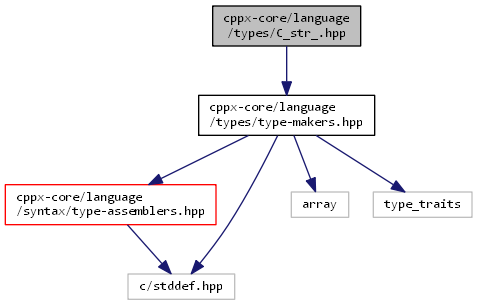C_str for char const*; Wide_c_str for wchar_t const*; and Mutable_c_str and Mutable_wide_c_str as ditto mutable types.
More...
#include <cppx-core/language/types/type-makers.hpp>
Go to the source code of this file.
Namespaces | |
| cppx | |
Typedefs | |
| template<class Char > | |
| using | cppx::C_str_ = P_< Const_< Char > > |
| template<class Char > | |
| using | cppx::Mutable_c_str_ = P_< Unconst_< Char > > |
| using | cppx::C_str = C_str_< char > |
| using | cppx::Wide_c_str = C_str_< wchar_t > |
| using | cppx::Mutable_c_str = Mutable_c_str_< char > |
| using | cppx::Mutable_wide_c_str = Mutable_c_str_< wchar_t > |
Detailed Description
C_str for char const*; Wide_c_str for wchar_t const*; and Mutable_c_str and Mutable_wide_c_str as ditto mutable types.
The shortest names like C_str stand for const string data. The prefix Mutable_, as in Mutable_c_str, indicates mutable string data. This naming reflects an experience that handling const string data is by far most common.
Using the type names avoids issues with non-reading direction placement of *, and it supports prefix const. For example, instead of
char const* const s = "Blah";
... you can write
const C_str s = "Blah";
Of course, for this particular example it would be silly to throw away the string length information, so one should better use std::string_view and write
constexpr string_view s = "Blah";
Definition in file C_str_.hpp.
 1.8.15
1.8.15